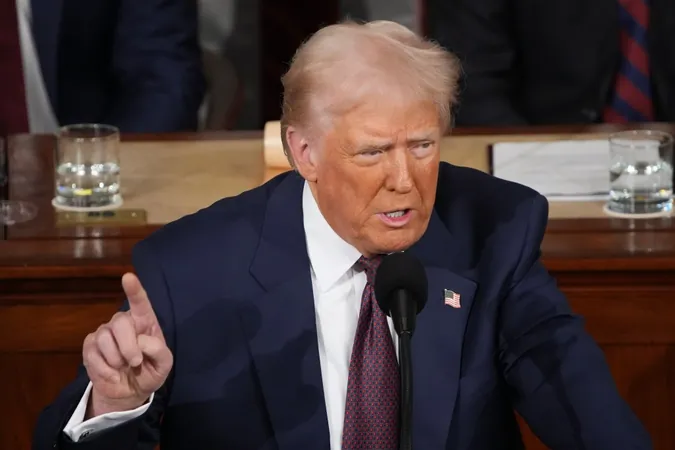
Trump Shrugs Off Concerns Over Rising Car Prices Due to Tariffs: “Americans Will Buy Domestic!”
2025-03-30
Author: Ying
Trump's Dismissive Stance on Rising Car Prices
In a bold declaration, President Donald Trump has made it clear that rising car prices resulting from his recently imposed 25% tariffs on all foreign-made auto parts and imported vehicles are not his concern. During a comprehensive interview with NBC News, Trump stated he “couldn’t care less” about the economic fallout as he doubles down on his commitment to American manufacturing.
Impact of Tariffs on the Auto Industry
The tariffs, which have sparked outrage among international automakers and prompted significant drops in shares for brands like General Motors and Ford, have intensified tensions in what many fear could escalate into a full-blown trade war. The American Automotive Policy Council, which represents domestic automakers, emphasized the need for tariffs to be implemented in a way that protects consumers from price hikes and maintains a competitive North American automotive market.
Trump's Confidence in American Manufacturing
Trump expressed confidence in the resilience of American-made products, declaring, “The message is congratulations, if you make your car in the United States, you’re going to make a lot of money. If you don’t, you’re going to have to probably come to the United States, because if you make your car in the United States, there is no tariff.” He further commented, “I couldn’t care less if they raise prices, because people are going to start buying American-made cars. We have plenty.”
The 'America First' Agenda
This stance, while controversial, aligns with Trump’s broader 'America First' agenda, which prioritizes domestic production and seeks to reduce dependency on foreign goods. The tariffs apply even to foreign auto parts assembled in the U.S., meaning manufacturers must adapt quickly to maintain their profitability. Importers benefiting from the United States-Mexico-Canada Agreement (USMCA) will initially remain tariff-free, but future processes for levying taxes are still pending.
Negotiations and Future Implications
Moreover, when pressed on whether there is “room for negotiation” regarding the tariffs set to be enacted on April 2, Trump replied, “Only if people are willing to give us something of great value. Because countries have things of great value, otherwise, there’s no room for negotiation.”
Potential Consequences for Consumers and Industry
Experts suggest that if these tariffs persist, the domestic auto industry could see a significant shift, with potential job creation within the U.S. manufacturing sector, while consumers may face limited choices and potentially higher prices. The unfolding situation warrants close attention as it could reshape the landscape of the automotive industry in both North America and beyond.
Conclusion
Stay tuned as this story develops – could American consumers be rallying behind domestic automakers, or will international brands find a way to weather the storm? Only time will tell!



 Brasil (PT)
Brasil (PT)
 Canada (EN)
Canada (EN)
 Chile (ES)
Chile (ES)
 Česko (CS)
Česko (CS)
 대한민국 (KO)
대한민국 (KO)
 España (ES)
España (ES)
 France (FR)
France (FR)
 Hong Kong (EN)
Hong Kong (EN)
 Italia (IT)
Italia (IT)
 日本 (JA)
日本 (JA)
 Magyarország (HU)
Magyarország (HU)
 Norge (NO)
Norge (NO)
 Polska (PL)
Polska (PL)
 Schweiz (DE)
Schweiz (DE)
 Singapore (EN)
Singapore (EN)
 Sverige (SV)
Sverige (SV)
 Suomi (FI)
Suomi (FI)
 Türkiye (TR)
Türkiye (TR)
 الإمارات العربية المتحدة (AR)
الإمارات العربية المتحدة (AR)